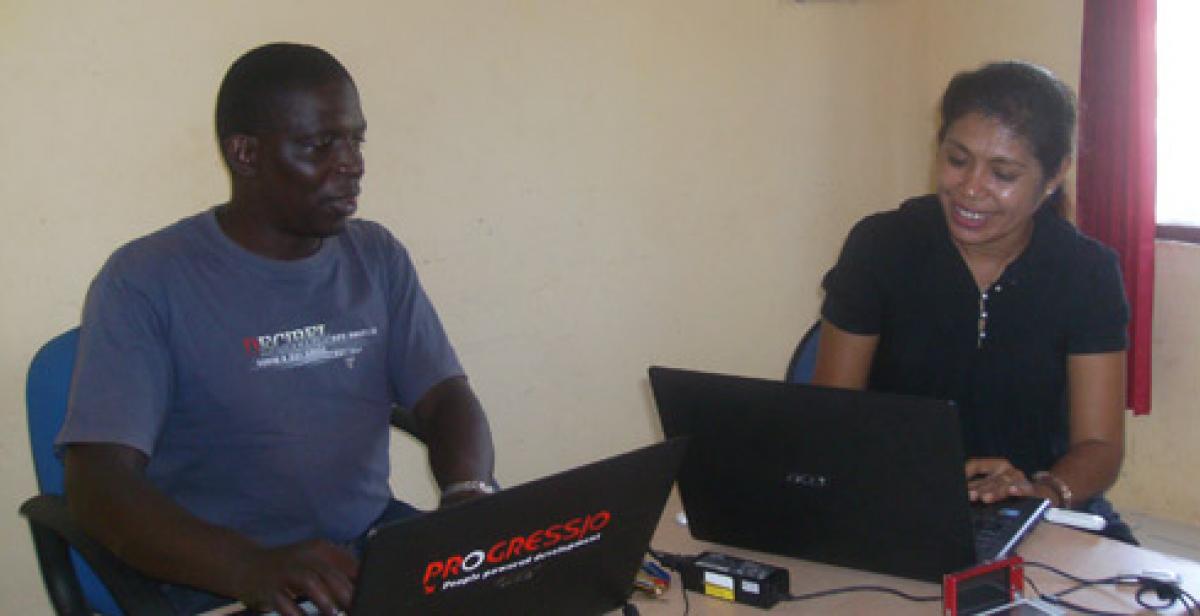Tobias, from Uganda, was a Gender Advocacy Adviser with the Foundasaun Esperansa Enclave Oecusse in Timor-Leste between 2011 and 2013.
What is your work background?
Before I joined Progressio, I worked in Papua New Guinea around the issues of gender advocacy and economic participation through supporting self-help groups of the most marginalised urban and rural women living with HIV. My role entailed building capacity, as well as mentoring self-help groups of women to lobby provincial and national policy formers to facilitate an equitable policy to allow their meaningful social economic participation. In Uganda I worked in the Ministry of Gender Labour and Social Services as a Gender Advocacy Adviser.
What inspired you to become a Development Worker with Progressio?
I started hearing about Progressio in May of 2009, from one of the Ugandan development worker who was working there. I immediately got interested in the Progressio model, which uses advocacy as a development vehicle. I am always inspired to make a difference in other people’s lives. Working with Progressio has given me the opportunity to share my skills with partners, as well as, empowering the most marginalised. Sometimes the change is small, but it creates the space for bigger things to come. In the process I have learnt much more through this work. This is greatly rewarding.
What is your first memory of arriving in your country of placement?
When I landed in Dili, the capital of Timor-Leste, I realised that the landscape shares a lot of similarities with Madang, where I carried out my former placement in Papua New Guinea. I felt at home and I went venturing in my favourite pastime; swimming. After one month of induction I joined my partner organisation in Oecusse. Oecusse is an enclave surrounded by Indonesia. The people are friendly and the place is a lovely and peaceful place. The town Pante Macassar has the essentials of daily life. I also make an occasional visit to Dili.
What do you enjoy most about your role?
I enjoy field visits to our clients (from the self-help groups) in their homes. I love to see the small initiatives grow into big adventures to improve rural lives. I love to see communities taking ownership and integrating new ideas in their way of life. I really like to see that programming is strengthened and capacity of staff is strengthened. On such visits, I can measure the progress and impact of the various projects that we implement. Then when I realise part of this development was due to my inspiration, I am filled with joy.
What has been the most exciting moment so far?
Empowering men and women through advocacy techniques and skills as well as create a critical awareness environment. Then with this consciousness the women’s groups are able identify political, social and economic issues that keep them in a marginalised state. Then they are able to demand their rights to be recognised and to feel capable of changing things through participation mechanisms.
And the biggest lesson?
That from small things, big things grow. I have seen new members of self-help groups take baby steps in gaining skills in literacy, numeracy, leadership skills, and literally changing their lives and communities. They are empowered to gain the confidence to take action as well as critical awareness of their rights. These members lighten up and they take on the attitude that “Yes we can”.
What is the biggest change you have witnessed since starting your placement?
I have witnessed adult people being empowered with life changing skill like literacy, numeracy and public speaking skills. On the other hand, rural marginalised women, now have the confidence to speak up to demand accountability and transparency in government mechanisms. There is also better programming with my partner, which has greatly improved the service delivery to our clients.
What is the biggest development challenge facing the country where you are working and area in which you are working?
The main challenge in Oecusse is infrastructure. During the rainy season, the floods cut off sections of the sub district. Travel to visit partners is very hard and precarious. So work has to recline.
If you could change one thing, what would that be?
I would continue to strengthen the networks and support the marginalised to engage the district and national level policy formers to continue to prioritise gender as a development vehicle. I would continue to work with partners on awareness-raising and information giving, and upgrading the knowledge and skills through building the staff capacity. I would also continue to highlight the hardships of the rural women in Oecusse.
What strikes you most about Progressio’s development worker model?
The model brings into play the relevant skills to support partners to catalyse the development process by empowering the marginalised communities to demand their role to participate in governance of their affairs.
What advice would you give to someone who is thinking of becoming a development worker?
Progressio will give you the opportunity to change the lives of the most marginalised while learning all the way.
Where do you see yourself once your placement has ended?
I am still interested to continue to contribute to the development of Timor-Leste. There are many areas, where I can support in the development of human capacity. There is still a lot of good work to support in Timor-Leste and especially here in Oecusse.



